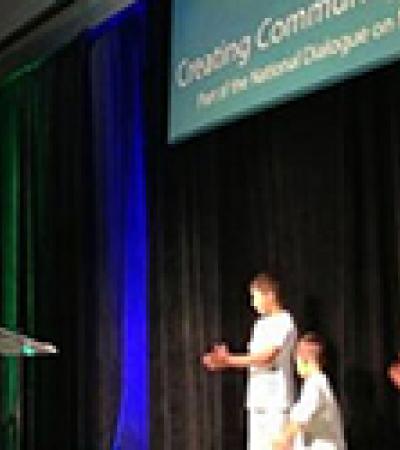During the 2013-14 academic year, Temple University Libraries' Beyond the Page series framed critical conversations around the theme of food. Panels, presentations, lectures and discussions examined food and food-related projects through aesthetics, the social sciences, resource inequity, public health, media, the culture of critique, communities, planning, design and other topics of importance at our university and in our community. Conversations on obesity, urban agriculture and the local food movement addressed food’s impact on individual health and communal wellness. The series also explored cultural traditions through programs on the history of Thanksgiving dishes, Philadelphia foods and more.
Advanced Planning
This program was planned to intersect with emerging interests in food and food culture on both the university's campus and throughout the Philadelphia region. Planning for a season of programs typically begins during the previous May.
In this instance, the urgency of exploring the ways we eat and its consequences became clear as we connected with on- and off-campus groups during the planning phase. A plethora of intersecting interests, partners and projects emerged, demonstrating the need for the conversations taking place in the Gather Around the Table series. As a result of these connections, faculty and administrators designed the Foundations sequence — required for all freshman at our Tyler School of Art — and an Eating Cultures course to intersect with our Gather Around the Table series. We also discovered students and neighbors working together to transform abandoned lots into gardens in order to create more sustainable foodways for communities. These innovators and activists then presented their work at the library.
We also developed co-programming with partners around the city, including the What We Sow initiative by the City of Philadelphia Mural Arts Program; the What is Your Food Worth? series organized by the Feinstein Center for American Jewish History; Philadelphia-area synagogues; cultural organizations; and various activist groups.
Marketing
We marketed these events in several ways. The first way was through existing outreach tools, which also happened to be free. Next was to leverage partnerships, band together with other organizations and help each other reach new and continuing audiences. We also produce biannual calendars with our events and programs that reached an extensive mailing list of nearly 10,000 people. For each single program, we produced postcards, fliers or digital graphic programs that circulated to our targeted audiences. We also used Facebook and paid advertising in local cultural outlets.
Budgeting
The budget for the entire series (two semesters, September 2013 through May 2014) was $40,000. This was a relatively modest cost that covered all expenses related to planning and executing programs. It was also inclusive of speaker honoraria, speaker travel, and design and production of print postcards and posters.
The budget paid for execution of the 17 programs, photography and videography that documented each of the programs, refreshments, rental of sound systems and microphones for programs (when appropriate) and wages for audio-visual technicians to run the different systems. This budget also included advertising in local weekly papers and on public radio stations such as WHYY.
All of our programs were free and open to the public. Our efficient and creative allocation of resources ensured that our programs and events remained as accessible as possible while maintaining a low-overhead budget.
Day-of-event Activity
Set-up for events and programs at Temple University Libraries was handled by our centralized facilities staff with one full-time and two part-time staff members. On-site program management was executed by one full-time and one part-time staff members. Several partnership programs included other offices, organizations and departments contributing their time and labor.
Program Execution
The ongoing goal for our Beyond the Page series was to engage individuals throughout campus and the greater Philadelphia region with the resources found at Temple, while also offering a place for the community to gather and learn.
We hosted 17 programs throughout the Gather Around the Table initiative, attracting 900 guests to the libraries. We also developed and leveraged partnerships with the Department of Architecture, the Department of Legal Studies, the Department of Visual Studies, the Center for the Humanities at Temple University, Temple Contemparyan (an on-campus gallery), the Feinstein Center for American Jewish History, the Office of Campus Sustainability and the Center for Obesity Research and Education, a partner with for the Gather Around the Table series. Because of our various partnerships, we employed a broad range of skills and interests in order to plan our programs with an array set of interests.
We also drew on the skills and expertise of off-campus partners including Philly Urban Creators, The Philadelphia Food Trust, Temple Community Gardens, Weaver’s Way Co-Op, DesignPhiladelphia and the City of Philadelphia Mural Arts Program. We were able to leverage audiences, expertise and expand on the critical conversations surrounding food simultaneously at a variety of diverse community organizations. In some cases, individuals from these local projects served as program participants as well.
The breadth and depth of new partnerships and audiences that we gained helped make this program a success.
Advice
My advice would be to engage with your communities early in the planning process. Do not come up with ideas and immediately put them on board, but rather collaborate for true engagement. Also, plan programs around the interests and questions relevant in your communities; basically, don't host an event just to host it. Our programming themes generally emerged from the conversations and projects taking place at Temple University or throughout the city, so we already saw a tangible interest in these issues..


